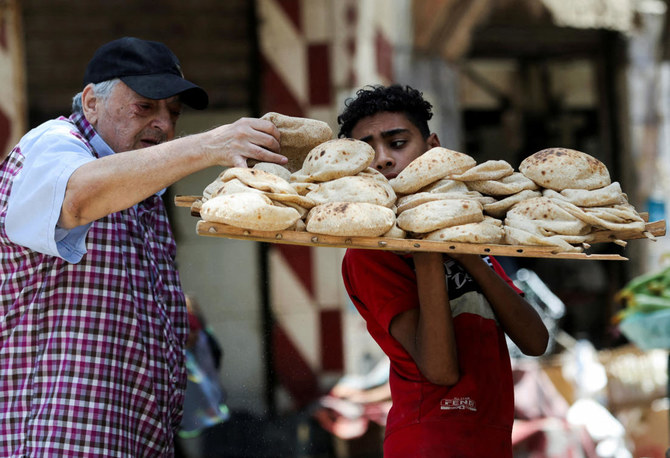
Egyptians suffer the first reduction in bread subsidies in decades
Gamal Ahmad and millions of other Egyptians are finding it more difficult than ever to make ends meet due to the price of subsidized bread having quadrupled.
The 64-year-old retiree was already having financial difficulties before Egypt’s government raised the price of subsidized tiny loaves of flatbread on June 1 for the first time in decades due to an increasing wheat import bill.
More than 70 million people have access to the loaves, which are essential for the most impoverished. Many households find it difficult to afford the increase from five piasters to twenty piasters ($0.0042) per loaf, even with the steep discount.
Gamal stated, “We can’t handle any more [price increases],” adding that the government’s announced cuts to subsidized utilities are another concern.
“Bills for gas, electricity, and water are still due. Every price is going up,” he declared.
Millions of people will be impacted by the price rise because the subsidized loaves are a staple for a large portion of the 106 million-person population.
A senior named Mohamed Abdelaziz stated, “Of course, the price hike impacts me,” while he was in central Cairo looking for subsidized bread. “We are barely getting by.”
He claimed he had to continue working to support his three unmarried children and supplement his 2,000-pound ($42.46) state pension each month.
In a nation where poverty is pervasive, raising the price of the subsidized bread was a politically delicate move that had been postponed for years. Cheap bread is crucial for many people.
Despite several rounds of austerity reforms, the price had remained constant since the 1980s because the government was afraid of the public’s reaction. In 1977, there were riots caused by an attempt to alter the subsidy scheme.
The government had previously attempted to limit eligibility and lighten the loaves’ weight rather than raising the price.
Bread subsidies, which are dependent on income and provide a daily amount of five loaves, are received by about two thirds of the populace.
In a nation where the minimum monthly pay is 6,000 pounds, a family of four may now face a monthly charge of 120 pounds instead of 30 pounds after a 50% increase in March.
Elevated Inflation
With annual inflation reaching 38% in September of last year and currently running at 32.5% in April, the government took action. In addition, Egypt has a substantial debt service obligation and permitted a significant currency devaluation in March when it switched to a flexible exchange rate mechanism.
According to dealers, Egypt is frequently the world’s top importer of wheat, and the short-term quantity of state purchases is not anticipated to alter as a result of the price shift. The cost of the government importing wheat has increased due to the sinking currency and widespread inflation.
According to Supply Minister Ali Moselhy, the increased price only covers 16% of the bread’s manufacturing costs, which are mostly due to the depreciation of Egypt’s currency and rising wheat prices worldwide.
According to Moselhy, the government is increasing its funding for bread subsidies in the 2024–2025 state budget from 91 billion Egyptian pounds ($2.65 billion) to around 125 billion Egyptian pounds.
Moselhy stated that after the price rise, the ministry had not received any objections from the public.
Although the administration claims to be broadening the social safety net, some of its detractors are questioning the elimination of bread subsidies in light of the government’s heavy expenditure on massive projects that have increased debt.
Timothy Kaldas, deputy director of the Tahrir Institute for Middle East Policy, stated that the state should prioritize eliminating exemptions for military-owned businesses that have long benefited from financial advantages.
The price hike on subsidized bread will “a significant hit for poor households,” he declared.
After a crackdown on dissent and a prohibition on the majority of public protests, the measure may not encourage people to hold rallies, but it may increase public resentment at the state of the economy, he said.
On Saturday, Moselhy was questioned by local TV anchor Lamis El Hadidy about why 62% of budget expenditure went toward debt service and 11% went for subsidies.
Moselhy responded, “We are talking about our current reality and what to do tomorrow,” in reference to Egypt’s obligation to pay back its loans.
$1 is equal to 47.1000 Egyptian pounds.
All Categories
Recent Posts
Tags
+13162993331
zoneyetu@yahoo.com



